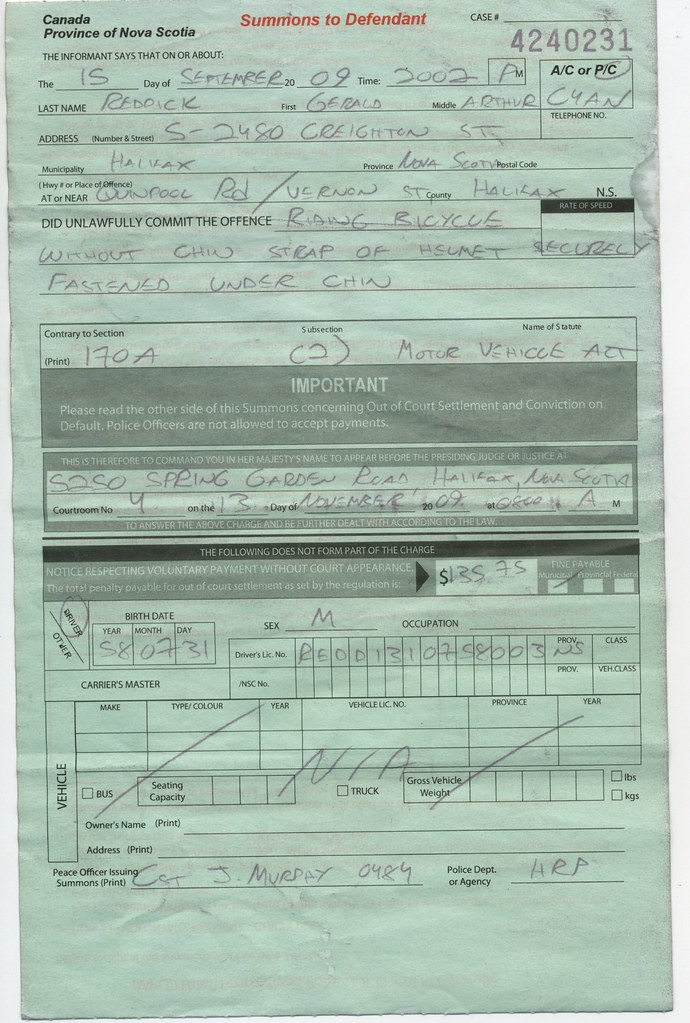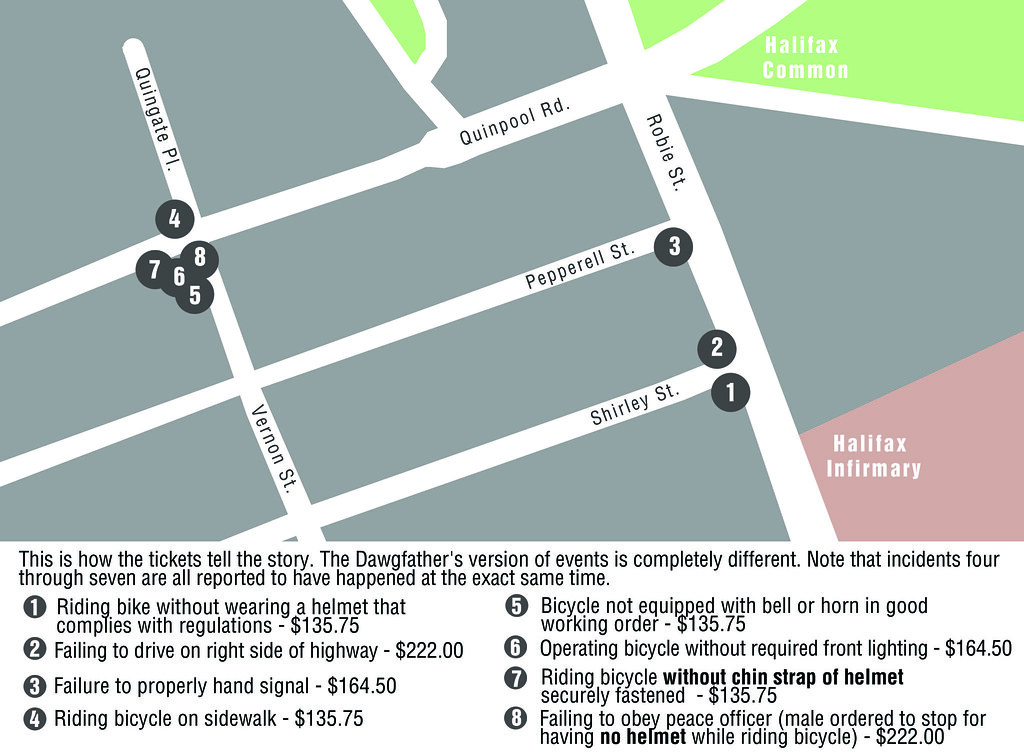Last night, my "Dawgfather v. the police" story that was published in The Gazette in September won a Canadian University Press award for excellence in student journalism,
. The prize comes with a $500 cheque, and an inscription on the CUP News Writing winners plaque.
Because the Gazette website hasn't been updated since last year, and my story never made it up there, anyway, due to a delay of web work at the beginning of the school year, I'm posting the winning story here, so it can be read somewhere, at least. The story is missing the excellent photo of the Dawgfather holding a bike, which was printed with the story and shot by Pau Balite, but here is a photo of the man I found on the internet:
Dalhousie Gazette 142-03, Sept. 25-Oct. 2
The man selling hot dogs in front of the Student Union Building knows his rights. As a black Muslim in a city with ingrained racism, he says he has to.
Every student at Dalhousie knows him as the Dawgfather. The Halifax Regional Police department knows him as Gerald Arthur Reddick. They know him as the man ticketed, in the space of two minutes, for eight different bicycle violations on the night of Sept. 15.
The fines on the eight tickets add up to $1,316.
But the story Reddick tells about that night is very different from the story as it is recorded in pencil scratches on the eight green slips of carbon paper.
The police department can’t comment, because the matter is before the courts. But they confirmed that eight summary offenses were handed out to a man on a bicycle between 8:00 and 8:02 p.m. on Sept. 15.
According to the tickets, the episode begins at the corner of Shirley and Robie Streets, just south of the Atlantica Hotel.
Each ticket has a number in the top right corner. The first number is 4240230.
“Riding bycicle without wearing bicycle helmet complying with regulations,” the offence box reads, in block capitals.
The ticket is filled in with Reddick’s driver’s license number, home address, as well as the exact section of the Motor Vehicle Act violated, and the time and date Reddick is summoned, to appear in court. The officer wrote “2000,” or 8:00 p.m., as the time the offence was allegedly committed, and signed Cst. J. Murphy 0484 on the line at the bottom.
The next ticket, 4240231 in the top corner, places the action at Quinpool and Vernon, two blocks north and two blocks west of where the first offence is alleged to have occurred.
“Riding bicycle without chin strap of helmet securely fastened under chin,” is written in the offense box on this one. The time slot says 8:02.
After this, the numbers in the top corner start to make less sense. The next few are still written down as occurring at Quinpool and Vernon, or Quingate and Quinpool, just across the street. But 4240237, the last one apparently written, carries the heaviest fine of the bunch, $222, and is written up as having occurred back at Robie and Shirley, at 8 o'clock.
Every single ticket is filled out in detail, listing Reddick’s address, driver’s licence number, and the time and date he is scheduled to appear in court. Every ticket says either 8:00 or 8:02 as the time the offence was allegedly committed.
But the ticket numbered 4240236 is the most controversial, to Reddick. It also carries a fine of $222.
It alleges Reddick committed the offence of “failing to obey a peace officer.” It says he was “ordered to stop for having no helmet while riding a bicycle.”
“You can’t have a time where you don’t have a helmet, and then you don’t have a strap,” the Dawgfather says. But his main problem is with the “failure to obey” allegation. And the police officer’s main problem might have been that, as well.
How he lost them
The timeline on the tickets does not correspond to how the Dawgfather tells the story. He says he was riding north on Robie Street, in the west lane. A cruiser going the same way, but on the eastern branch of the road, slowed and the cop inside yelled over to him from across two lanes of traffic.
“He said ‘Yeah, you gotta walk that bike without a helmet.’ I’m like, yeah, right whatever buddy.” Reddick says.
He was wearing a helmet at the time, but his turban obscured it.
“I know he’s gonna turn on Quinpool and try to catch me at the corner of Quinpool and Vernon, which he did,” Reddick continues.
“When he saw me there, he said ‘pull over.’ I said ‘For what? I’ve got a helmet on, I ain’t pulling over.’ He says ‘Pull over cuz I said so.’ I said ‘Not since 1982, buddy, that don’t work no more.’”
The Dawgfather was citing sections 8 and 9 of the 1982 Canadian Charter of Rights and Freedoms, which protect citizens against “unreasonable search or seizure” and grants Canadians “the right not to be arbitrarily detained or imprisoned.”
So, as the police car made its left turn from Quinpool to Vernon, Reddick rode on into Quingate Place, already late for prayers at the mosque. The cop car makes a U-turn, goes through the lights and into Quingate, in pursuit of the man on the bike. When the car parked and the cop got out, the Dawgfather says he turned his bike around, crossed Quinpool again and went through the Tim Hortons parking lot.
He watched the cop car head west on Quinpool before he re-crossed Quinpool, heading north, free from the unwelcome tail. That, he says, was the only interaction he had with the cop.
Until 5 a.m. the next morning.
How they found him again
“Five o-clock, a knock come on my door, pretending to be Randy’s pizza,” he says.
“I didn’t order pizza. I say, ‘go upstairs, they probably ordered it upstairs.’ But it’s five o’clock in the morning, I know nobody ordered pizza,” Reddick says.
The man outside says, “Well, somebody did,” and that he will leave the pizza on the step. “He thinks I’m gonna open the door for free pizza!” Reddick says. “Once he realize that didn’t work, a few minutes later [knock, knock, knock]. ‘City police … can I talk to you?’ I say ‘We’re talking, I can hear you.’ He says ‘Can you open the door?’ I say ‘No.’”
“So, I called the police and reported them. I said ‘There’s pizza men at my door pretending to be cops. She called me back and said ‘No, they actually are cops.’”
When he opened his door hours later, the eight tickets fell to the floor.
If Reddick’s story is true, the non-consecutiveness of the numbers on the top corners of the tickets makes sense. J. Murphy’s exact knowledge of when Reddick will be expected to appear in court also makes sense, if the summons were delivered after the fact. 5250 Spring Garden Rd., courtroom 4, the morning of Nov. 13.
What doesn’t make sense, is why an officer of the peace is visiting citizens at 5 a.m., announcing themselves as a pizza delivery, to deliver summons. Also, Reddick says the police officer was never close enough to the bike to see whether or not it had a horn or a bell (ticket #4240234, $135.75) or front lighting (ticket #4240234, $164.50).
The Dawgfather says he has had many run-ins with police, but this one was the last straw.
“This one here, I’m not going to let them get away with,” he says.
“These guys are so out of control. And we don’t fear them the way the average person fears them. We, in our community, are fully aware of [the Charter of Rights and Freedoms],” he says.
“We exercise our rights, because for the longest time we didn’t have any.”






























